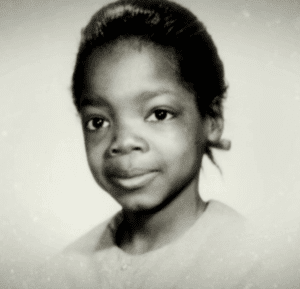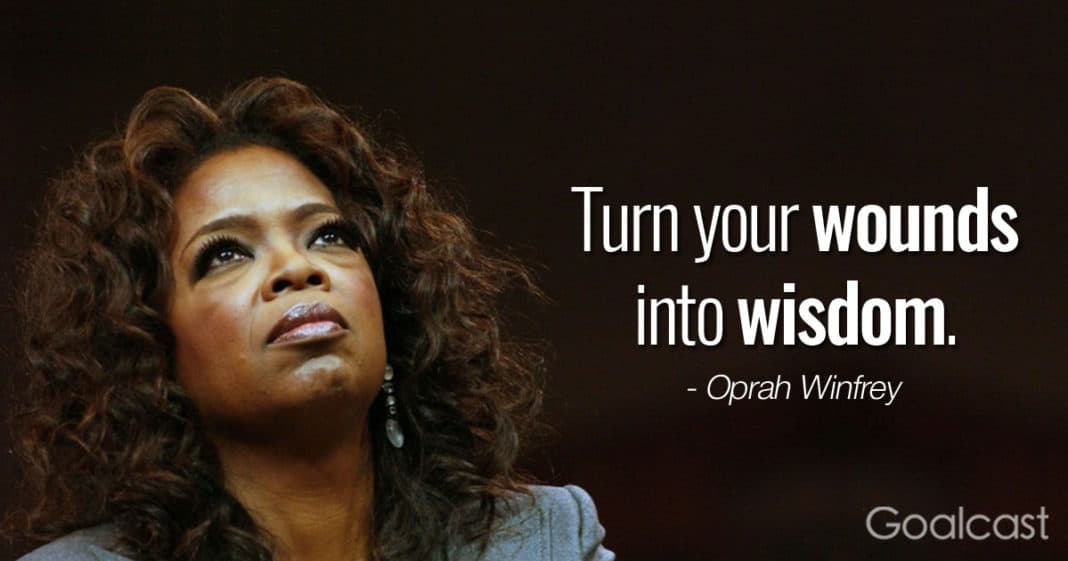 Suppose you're a girl of African ancestry born in the deep South in the 1950s. Your family is poor and rural. You're the daughter of an unmarried teenage mother. Shortly after your birth, your parents split up. You live with your grandmother, then your mom, then your dad. As a young woman, you're repeatedly sexually abused, resulting in pregnancy at the age of 14.
Suppose you're a girl of African ancestry born in the deep South in the 1950s. Your family is poor and rural. You're the daughter of an unmarried teenage mother. Shortly after your birth, your parents split up. You live with your grandmother, then your mom, then your dad. As a young woman, you're repeatedly sexually abused, resulting in pregnancy at the age of 14.
What would the world expect of you?
Many might expect you to become homeless, perhaps dependent on drugs or alcohol, or married to an abusive spouse. Or go to work in a low paying job without many prospects. Expectations? Not all that high if at all. Life has dished out a hard, painful start. How can you possibly succeed?
You're very bright, verbal, beautiful. Even that doesn't matter. What matters to you is what you believe is possible and your clear intention to make it real.
You defy expectations with your success. You become a global celebrity. You're awarded the Medal of Freedom by the President of the United States. You receive honorary degrees from Duke and Harvard. Your life touches millions, launches the careers of many well-known authors and teachers and you do it all before your 60th birthday.
Are you wondering who this is?
This person won a beauty pageant as a teenager, got her first job in broadcasting before the age of 20, became the most popular syndicated talk show host in the world before the age of 40, was nominated for multiple awards as an actor, started an award-winning magazine and launched her own television network.
By now you must know I'm talking about Oprah Winfrey.
But . . . why am I talking about Oprah in this blog?
The question I'm asking today is not how Oprah defied stereotypical expectations. Yes, she became a master of her domain. The question for today is: is Oprah Winfrey an Entertainment Master or is she also a Vision Master? Vision Masters are innovators, leaders, visionaries, creators, inspirers, change-makers, transformers and pretty much unstoppable.
I wasn't a viewer of Oprah's daytime program or reader of her magazine. To answer that question, I've been catching up now. Here's what she writes (on Oprah.com):
"It's not that I've always known who I would be. It was just very clear to me from an early age who I wouldn't be.
The opportunities for a girl born black in Mississippi in 1954 were limited. You could teach in a segregated school. Or be a maid. A cook. A dishwasher. A servant. I never thought that would be the life for me.
I vividly remember standing on my grandmother's small screened-in back porch, churning butter while she boiled clothes in a big black cast-iron pot in the yard. As she pulled the steaming clothes from the pot to hang on the line to dry, she called to me, "Oprah Gail, you better watch me now, 'cause one day you gon' have to know how to do this for yourself."
I did what she told me. I watched carefully as she pulled the clothespins from her apron, held them two at a time between her lips, and placed one and then the other on opposite ends of the sheets and towels and shirts and dresses she hung on the line.
A still, small voice inside me, really more a feeling than a voice, said, "This will not be your life. Your life will be more than hanging clothes on a line."
The certainty of that divine assurance got me through many a difficult moment during my growing years."
If Oprah had only a vision for own success say as an entertainer, we would honor her, yes as an Entertainment Master but we wouldn't honor her as a Vision Master. Is she, in fact, a Vision Master?
Note that her vision was to be a teacher, not an entertainer. In her words:
"I wanted to be a teacher. And to be known for inspiring my students to be more than they thought they could be. I never imagined it would be on TV.
I believe there's a calling for all of us. I know that every human being has value and purpose. The real work of our lives is to become aware. And awakened. To answer the call."
From what I can tell, from a young age, Oprah had a vision for the world that created the trajectory of her life. Said by her in many places in different ways, Oprah envisions a world in which ALL people fully express the greatest version of themselves. This, of course, includes herself; but she extended this vision for herself onto others, which is how she comes a visionary. She sees the possibility that every person takes responsibility for their personal evolution rather than just blaming circumstances for holding them back. And she's not just talking about taking responsibility for survival; she's talking about taking responsibility for expressing the best version of yourself. This is her vision.
I'm not claiming Oprah is completely original in her vision. Others social leaders have taught something similar, including the founders of the human potential movement such as Alexander Everett, Abraham Maslow, Virginia Satir, Warner Earhart and so many others you may have heard of, met or experienced. However, as you experience Oprah, you'll find a version that is uniquely personal and inspiring to many.
Now onto the second question of the day: Is Oprah only a visionary or a Vision Master? Does she only envision a brighter future or she is also particularly effective in making it real?
In order to be a Vision Master by our definition, she has to be effective in making her vision real. Clearly, she's successful in entertainment. So the question I ask is, does she lead others EFFECTIVELY in order to bring about her vision:
To this end, people that have worked in senior positions within Oprah's businesses say that she has an uncanny ability to make everyone feel worthy. She remembers the names of hundreds of employees, many of whom she doesn't see often. She delegates responsibility, providing that sense of self-directed autonomy that is a key aspect of successful business teams. She holds people accountable but does so in a way that doesn't crush the spirits of people she chastises. This seems to work for her, and there's more.
Like other Vision Masters, Oprah hires only people she considers highly talented and motivated -- but they must also share her vision, then embody it in their work and in their lives. Oprah also relies on the wisdom of trusted mentors, to whom she gives much of the credit for her success. Oprah picks the right aligned team, clearly communicates her vision, then inspires her teams to help her (and them) achieve it. And there's more.
Perhaps most intriguing, Oprah leads by example.
"What I’m trying to do with the Oprah Winfrey show is the same thing I’m trying to do with my life, is to get people to see where they are stuck in their lives and be able to live up to what ever is their human potential. I am trying to do that for myself. That is why I am never satisfied where I am in my life. I am always trying to push the envelope. What is the next level? What is the next level? How do I grow myself to be a better person?"
Oprah's management style is therefore animated by the thought that if she could overcome the challenging circumstances of her early life, surely those working for her can do the same in their lives. Surely that is a primary purpose of life, of coming to work every day. So she employs something like the "Mission Impossible" management style I've described before, but with greater sensitivity to each individual. Here's how she does it:
In her unique case, since she's teaching the possibility of personal transformation, she adds the element of authenticity. The public Oprah seems to be the same as the office, Oprah. People respect authenticity. It breeds trust. Trust breeds a willingness among her staff to act boldly to play their role in grounding Oprah's visions into reality.
Does her style work? Is she a Vision Master?
The results speak for themselves. The Oprah Winfrey show won 18 Emmy's. Her magazine "O" has nearly 2.5 million subscribers. Her OWN television network reaches 80 million homes. Her book club was responsible for 55 million sales of books.
By the way, there's a trap for her in this unique management style. A trap she's not fallen into. Can you see it? If you do, I'd like your comments.
Thanks, Oprah. You're an inspiration to every Vision Master struggling to launch and grow a company, to see their purpose made real.
Key Takeaways:
 Everyone has challenges on the road to success, beginning in childhood, but these challenges need not define you.
Everyone has challenges on the road to success, beginning in childhood, but these challenges need not define you.- Everyone also has a unique value, purpose, and calling, which can and should define you.
- Oprah Winfrey stands for the vision that everyone can 1) become aware of, and 2) express their full potential.
- By everyone, she means EVERYONE.
- Oprah's success lies in continuously seeking mastery of the skills to make this vision real
- Oprah's unique management style embodies her vision.
- There's a peculiar trap in this management style, which Oprah has deftly avoided. Can you spot it?

 Everyone has challenges on the road to success, beginning in childhood, but these challenges need not define you.
Everyone has challenges on the road to success, beginning in childhood, but these challenges need not define you.